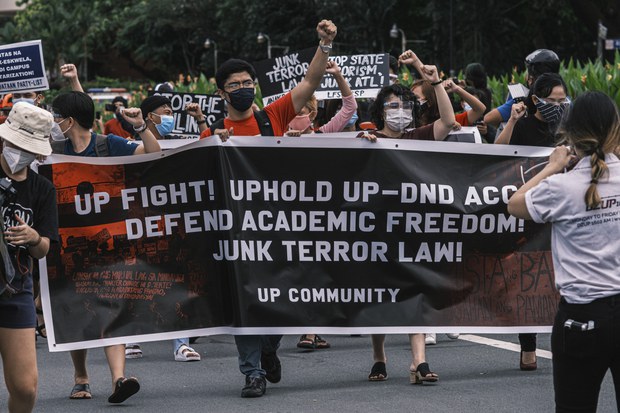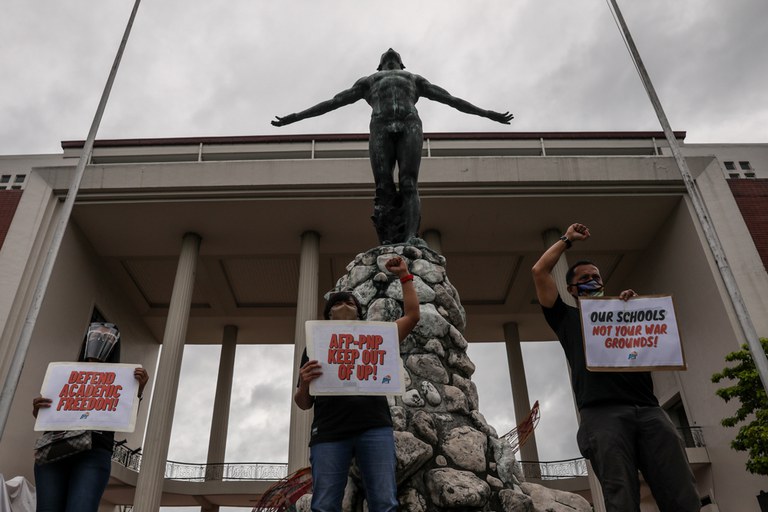Govt will Allow Security Forces to Enter University of Philippines
2021.01.19
Manila
 Students from the University of the Philippines in Manila stage an on-campus protest against a decision by the defense department to drop an accord barring security forces from entering the campus without the consent of university officials, Jan. 19, 2021.
Students from the University of the Philippines in Manila stage an on-campus protest against a decision by the defense department to drop an accord barring security forces from entering the campus without the consent of university officials, Jan. 19, 2021.
The defense secretary Tuesday defended a government move to terminate an agreement that barred security forces from entering the Manila campus of the state-run University of the Philippines, as he cited concerns about it being a haven for communist insurgents.
The move by the Department of National Defense, announced on Monday night, was widely criticized on Tuesday as potentially trampling on dissent and free speech, while students from the campus staged a protest in response to it.
Students’ outspokenness on issues, such as President Rodrigo Duterte’s controversial war on drugs, had caused the campus to fall out of favor with his administration. Duterte had threatened to defund the university, and accused its students of spending more time away from their classrooms to protest in the streets.
“The country’s premier state university has become a safe haven for enemies of the state,” Defense Secretary Delfin Lorenzana said in defending the move announced by the government on Monday night.
“The Department of National Defense will neither renege nor shirk on its duty to protect the rights of the majority. It will not tolerate those who will violate the laws of the land in the guise of lawful public dissent, free assembly and free speech.”
A 1989 agreement between the Manila campus and the government had been rendered “obsolete,” Lorenzana said. The pact was a “gesture of courtesy” but times had changed, he said.
The pact did not cover the university’s 16 other campuses. Under the agreement, government security forces could only enter the Manila campus with permission from university officials.
The agreement came about two weeks after university staffer Donato Continente was arrested on campus and charged with the killing of U.S. Army Col. James Rowe, who was assassinated by a communist hit-squad. Continente, who served a 14-year sentence before being freed in 2005, claimed he was not guilty but had been tortured into confessing.
In his letter to the university ending the pact, Lorenzana said many members of the campus community had been identified as sympathetic to the outlawed Communist Party of the Philippines and its armed wing, the New People’s Army (NPA), which allegedly had found fertile ground to recruit new members.
The defense department “intends to remedy this situation by terminating or abrogating the existing ‘agreement’ in order for us to perform our legal mandate of protecting our youth against CPP/NPA recruitment,” Lorenzana said.
Lorenzana said that the department would not station military or police forces inside the campus, nor would it stifle activist groups, academic freedom and freedom of expression.

Move criticized
Academics, opposition members and activists denounced the unilateral termination of the agreement. University President Danilo Concepcion said it was “totally unnecessary and unwarranted.”
He also called out the government for terminating the pact without consulting his administration first.
“Instead of instilling confidence in our police and military, your decision can only sow more confusion and mistrust, given that you have not specified what it is that you exactly aim to do or put in place in lieu of the protections and courtesies afforded by the agreement,” he said in reply to Lorenzana’s letter.
Philippine Vice President Leni Robredo said the agreement was signed more than three decades ago as a safeguard against warrantless arrests.
Robredo, who is a lawyer and opposition leader, said the aim of the accord was not to exempt students from the law “but to send the clear message that in a democracy, even a fledgling one, law enforcement [is] conducted following clear rules [and] within defined limits.”
“That in a democracy, there [is] no place for relentless war waged across all borders, without oversight or accountability, against any person those in power had decided to brand as ‘an enemy,’” she said.
She called the move an act of intimidation.
“Clearly then, this is not a practical gesture, but a symbolic one,” Robredo said. “One designed to sow fear. One designed to discourage dissent. One designed to silence criticism.”
Luis Liwanag in Manila contributed to this report.







